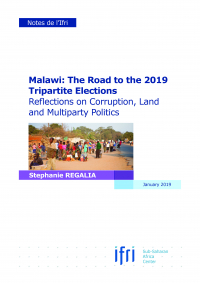Gateway to Think Tanks
| 来源类型 | Publications - Policy Papers |
| 规范类型 | 简报 |
| DOI | 978-2-36567-973-2 |
| Malawi: The Road to the 2019 Tripartite Elections. Reflections on Corruption, Land and Multiparty Politics Notes de l'Ifri, January 2019 | |
| Stephanie REGALIA | |
| 发表日期 | 2019-01-22 |
| 出版年 | 2019 |
| 概述 | On May 21st 2019, Malawi will hold its tripartite elections, where voters will vote for the President, Members of Parliament and local Councillors. 2019 will also mark the 25 years of multiparty politics in Malawi since the one-party regime presided by Hastings Kamuzu Banda came to an end in... |
| 摘要 |
Malawi: The Road to the 2019 Tripartite Elections. Reflections on Corruption, Land and Multiparty Politics Notes de l'Ifri, January 2019
On May 21st 2019, Malawi will hold its tripartite elections, where voters will vote for the President, Members of Parliament and local Councillors. 2019 will also mark the 25 years of multiparty politics in Malawi since the one-party regime presided by Hastings Kamuzu Banda came to an end in 1994.  The transition to multiparty democracy has been encouraging with the number of large political parties steadily growing and power peacefully changing hands between the four presidents, the country has known since 1994. In this context, the race to the 2019 elections is particularly competitive. The most recent polls place voter intention for the outgoing president Peter Mutharika and his Democratic Progressive Party (DPP) at a near tie with the lead opposition candidate Lazarus Chakwera of the Malawi Congress Party (MCP). The MCP used to be the only authorized political party under Hastings Kamuzu Banda’s rule. Its return to the forefront of voter intentions signals important changes in the landscape of political actors in Malawi. This paper explores some of the reasons behind this changing political landscape. It looks at the DPP’s recent loss of support due to discontent with rampant corruption and a controversial land reform passed in 2016. It also examines the landscape of challengers, including the current Vice President Saulos Chilima, following his departure from DPP ranks to form a new political movement, the United Transformation Movement (UTM). Given the diversity of large political parties in contention, which also includes Atupele Muluzi’s United Democratic Front (UDF) and Joyce Banda’s People’s Party (PP), the possibility of securing victory in the 2019 presidential election may rest on the ability of political parties to form strategic electoral alliances. This may require moving past political parties formed solely around the personality and identity of their leaders to a more issue-based political debate.
Malawi: The Road to the 2019 Tripartite Elections. Reflections on Corruption, Land and Multiparty Politics
|
| 关键词 | Corruption Elections Land political parties Politics Malawi Sub-Saharan Africa |
| URL | https://www.ifri.org/en/publications/notes-de-lifri/malawi-road-2019-tripartite-elections-reflections-corruption-land-and |
| 来源智库 | French Institute of International Relations (France) |
| 引用统计 | |
| 资源类型 | 智库出版物 |
| 条目标识符 | http://119.78.100.153/handle/2XGU8XDN/416474 |
| 推荐引用方式 GB/T 7714 | Stephanie REGALIA. Malawi: The Road to the 2019 Tripartite Elections. Reflections on Corruption, Land and Multiparty Politics Notes de l'Ifri, January 2019. 2019. |
| 条目包含的文件 | ||||||
| 文件名称/大小 | 资源类型 | 版本类型 | 开放类型 | 使用许可 | ||
| couv_regalia_malawi_(33KB) | 智库出版物 | 限制开放 | CC BY-NC-SA |  浏览 | ||
| regalia_malawi_2019.(1289KB) | 智库出版物 | 限制开放 | CC BY-NC-SA | 浏览 | ||
除非特别说明,本系统中所有内容都受版权保护,并保留所有权利。